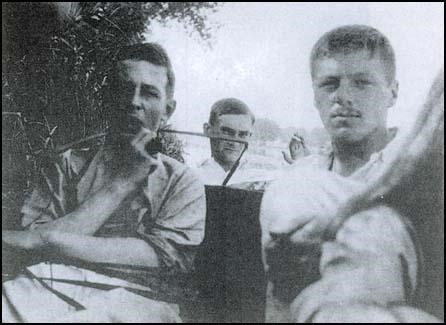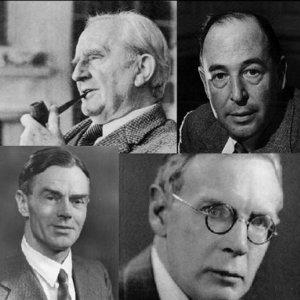"If I find in myself a desire which no experience in this world can satisfy, the most probable explanation is that I was made for another world."(Clive S. Lewis) Many know this renowned author, and are familiar with some of his books, but there is more to him than just his writing. C.S. Lewis, called Jack by his friends, was born in 1898 in Ireland, to A.J. and Flora Lewis. At 18, he joined the British army to fight in World War One, putting off his education to help defend his country. After severe injuries, he returned to Oxford where he became a professor. He formed a group with his friends, to be called the Inklings, who would bounce ideas off each other as they wrote books, some of which became highly popular, including The Lord of the Rings and Chronicles of Narnia. Many people who are considered heroes are the ones who have physically saved lives, given hope, and stood against the society in order to better it. For C.S Lewis. He not only fought for his country, but used his skills as a writer to better the lives of many, defend Christianity, and express his own beliefs. He is an inspiration because of his inspired works, his strength, and creativity.
 |
| C.S. Lewis with Earnest Moore in 1917 (Spartacus Educational ()) |
Many do not know it, but C.S. (Jack) Lewis was a World War One veteran, having served as a second lieutenant at the front lines in France. While many were drafted, Lewis decided to be strong, to stand against the invading Germans, and joined on his own. As an Irishman, Lewis could have avoided serving in the British army legally, but he didn't hesitate.
"Lewis initially joined a cadet battalion at Keble College. He made friends with a small group of students including Ernest Moore, Martin Somerville and Alexander Sutton. Lewis became a commissioned officer in the Somerset Light Infantry." (Spartacus Educational)
According to him, the enemy was the cold water and their own weariness were their "chief enemies". It takes a strong man to face the fact that not every part of a war he is in is just fighting. A lot of what he started to do was on the quiet side, which can turn weak men on their own people. If they think the fights will all be glorious victories, they'll likely grow impatient and get themselves and others in hazardous positions. It takes bravery to simply wait for your death and prepare for it. Lewis held to his work until the time came. Not only does it take a strong man to keep his composure, but to also be in command of rowdy soldiers and to tell them that it's not all going to be okay, but that they could all die if they were caught off their guard. Given he was still young, it took courage to lead in those circumstance, and tell them to stand down, what to do, and how to do it. On April 14, 1918, The Somerset light infantry were ordered to counter-attack the offensive of the German army at Riez du Vinage.
"At 6pm, the heavy artillery opened fire on the German-held village. At 6.30pm a creeping barrage began. The plan was that the men would follow behind the exploding shells, at the rate of 50 meters per minute. Sergeant Arthur Cook later pointed out: "One of the most extraordinary advertisements of look out we're coming I have witnessed in this war, in full view of the enemy; how they must have chuckled with glee."
According to Sergeant Arthur Cook, the "barrage moved too quick, leaving the enemy free to open up a devastating machine-gun fire on the target they had been waiting for.""(Spartacus Educational) One of the men hit was his good friend, Lieutenant Lawrence Johnson, who was taken to the nearest casualty clearing center, where he later died. Lewis was one of the men who made it in and had captured around 60 men. It seemed victorious until the German artillery began shelling the village, landing one explosive near Lewis, which splashed shrapnel into him, wounding him and killing Sergeant Harry Ayres.
Like his friend, he was escorted to a close-by Casualty Clearing Center, then to a hospital in Bristol. His recovery was slow, and in that time wrote a letter to his father saying,
"Nearly all my friends in the Battalion are gone. Did I ever mention Johnson who was a scholar of Queen's? I had hoped to meet him at Oxford some day, and renew the endless talks that we had out there...I had had him so often in my thoughts, had so often hit on some new point in one of our arguments, and made a note of things in my reading to tell him when we met again, that I can hardly believe he is dead. Don't you find it particularly hard to realize the death of people whose strong personality makes them particularly alive?"(Lewis)
Sergeant Harry Ayres' death could have easily been his own, but Lewis was lucky enough to feel the least of the explosive's power. He stayed mentally strong and at the end of it returned to Oxford. His education led him to become amongst the best Professors, teaching medieval and renaissance English. Unlike many, he was never really challenged by the trauma many soldiers face post war. His mental strength kept him going further and further, even through the deaths of loved ones at home. Even though his death was immanent, he kept doing what he wanted. Nothing he went through crushed him, in fact all that did not kill him made him stronger and more immune to the things that would try to bring him down.
 |
| The Inklings (Blogger.com ()) |
During his time in Oxford, he had a few friends, J.R.R. Tolkien, T.D. Weldon, and Hugo Dyson, who he would debate religion with. His talks and respect for them inspired him to look deeper into Christianity. T.D. Weldon often argued with him that the evidence for Christianity was exceptionally good, inspiring Lewis to look further into what he referred to as the "Christian myth" that he had thought to be illogical at the time.
"Lewis read the Gospels and was struck by the thought that they did not sound like fiction: the writers seemed too unimaginative to have made the whole thing up; the Gospels read more like reports than stories."(BBC)
Every time he went to seek something wrong with Christianity; he would become further inspired by who he called God. He would research as much as he could, and the more he did, the closer he came to acceptance. He was increasingly inspired by his friends Hugo Dyson and Tolkien. They constantly spoke to him about the resurrection and life of Jesus, and the evidence to support it. As he learned he was slowly becoming more convinced of a God, but not yet Jesus as the Christ. According to Lewis, there were different kinds of good and evil in the world.
For instance, there was "simple good", done by good people, like helping others. But God was able use the "simple evils" for his own purposes, resulting in a "complex good". "A merciful man aims at his neighbour's good and so does "God's will", consciously co-operating with "the simple good". A cruel man oppresses his neighbour, and so does simple evil. But in doing such evil, he is used by God, without his own knowledge or consent, to produce the complex good--so that the first man serves God as a son, and the second as a tool. For you will certainly carry out God's purpose, however you act, but it makes a difference to you whether you serve like Judas or like John."(Lewis)
There's not much more in life I can say is as inspiring and true as his quote. For example, even in Nazi Germany, we made allies and friends of countries that now are stronger in result, and re-established Israel as a country. Or when the earthquake and tsunami hit Japan, it devastated the country, but pulled people together that otherwise would have never worked together for a good greater than one for their own lives. Even September 11th in the US, was intended for evil, but moved the citizens of the US together in a united effort to stop terrorism. Not all his life is as inspiring as his works and written words. But when I read them, not many are more so inspiring than Clive Staples Lewis. C.S. Lewis is a hero because of his inspiration, and the ways he inspired others to be more and to consider the evidence for Christ.
 |
| Aslan (Title Trakk.com ()) |
Without Lewis' massive imagination, his works would most likely have gone entirely unnoticed. One of his most well known series, the Chronicles of Narnia, gave Lewis a chance to really show his love for animals of reality and legend. Although his friend, J.R.R. Tolkien did not fully approve of his finished works, and his publisher doubted how well the books would sell, he let his imagination be known.
"At the time of publication, The Lion, the Witch and the Wardrobe went against a trend towards realism in children's stories. Reviews of the books were not sympathetic; many were highly critical."(BBC) "It all began with images; a faun carrying an umbrella, a queen on a sledge, a magnificent lion. At first there wasn't anything Christian about them; that element pushed itself in of its own accord."(Lewis)
I love his creativity because of the way his beliefs and life finds its own way into his stories. As Lewis said, it didn't start out as a tool to teach children about Christianity, but when it was being written, that's what happened. It is said today, that people's thoughts, life, and actions can be altered by things they hear or read, and unintentionally, that's what his imagination did for people. It caused many to think more critically about what he wrote, and has been highly successful throughout the ages of doing so. His Narnia books, as he says, are like a pre-baptism for a child's mind, and though were not initially intended to be that way, later became what they were.
"I did not say to myself 'Let us represent Jesus as He really is in our world by a Lion in Narnia': I said, 'Let us suppose that there were a land like Narnia and that the Son of God, as he became a Man in our world, became a Lion there, and then imagine what would happen.'" (Lewis) "It is more like a hall out of which doors open into several rooms. If I can bring anyone into that hall I shall have done what I attempted. But it is in the rooms, not in the hall, that there are fires and chairs and meals. The hall is a place to wait in, a place from which to try the various doors, not a place to live in.(Lewis)
His own imagination on how things could happen, what might be, may be how he really got into people's minds to kind of manipulate, or enlighten people's minds. Something he realized in his own imaginative creativity in writing the Narnia books was that, like everyone else, he could open doors for people, but it was in the ways that people interpreted his words that would get them to walk through the door he opened. When he does this, nothing can happen if people don't read them for what they are. They may never notice the "open door". In reality, his creative words may be read and interpreted like a parable, if it is in the form of fiction. His creativeness has moved thousands, if not millions.
Throughout his life, no matter his losses, he kept strong, continued to be inspired by his friends; passing it on through books, and never lost his creativity. Even after his death, his teachings and stories continue to inspire people to go further, withstand more, and to never give in. His story of his life lives through his non-fictional books, and his beliefs live through his lively stories. Every year, more and more people become familiar with his books and more and more people's understanding grows beyond just today's, but also how their ancestors lived. "There are two kinds of people: those who say to God, "Thy will be done," and those to whom God says, "All right, then, have it your way"(Lewis) This teaching for instance has shown people that not all that happens is God's fault, but our own because we strayed from him. In another instance, Lewis says, "If you read history you will find that the Christians who did most for the present world were precisely those who thought most of the next. It is since Christians have largely ceased to think of the other world that they have become so ineffective in this." This quote alone has moved Christians to stop thinking of the worldly possessions we have now, to stop the greed that is so strong in our lives, and look to what will be and not what is. He had served as more than an officer, but also as a philosopher and religious ambassador. His life's works point people like me in the direction that can save others by pointing out the effects of love, faith, trust, and God.
Works Consulted
"Clive Staples Lewis." Gale Virtual Reference Library. Gale. Web. 15 May 2012.
"The Life of C.S. Lewis." C. S. Lewis Foundation - The Life of C.S.
Lewis. C.S. Lewis Foundation, 2009. Web. 16 May 2012.
"C.S. Lewis." BBC News. BBC, 06 Aug. 2009. Web. 15 May 2012.
Thaiss, Christopher J. "C.S. Lewis." Ebsco Reference Center. EBSCO. Web. 15 May 2012.
"Spartacus Educational." Spartacus Educational. Spartacus Educational. Web. 21 May 2012.
Page created on 2/5/2013 5:36:30 PM
Last edited 4/21/2019 7:42:53 PM
